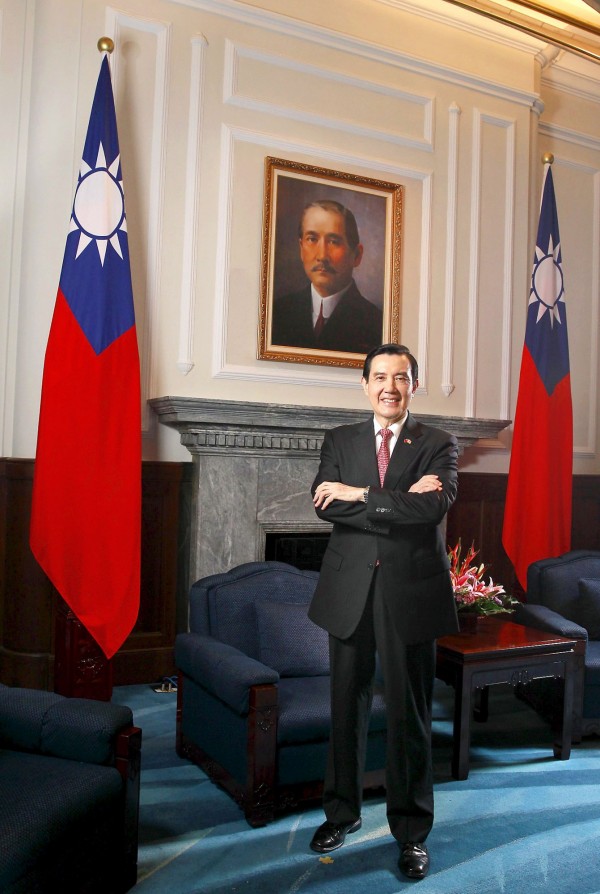《TAIPEI TIMES 焦點》 President says unification with China not on agenda

Taiwan`s President Ma Ying-jeou poses for a photograph near a portrait of Sun Yat-sen, the first president and founding father of the Republic of China, during an interview with Reuters at the Presidential Office in Taipei, Taiwan, October 1, 2015. Photo: Reuters
By Jean Yoon and J.R. Wu / Reuters, TAIPEI
President Ma Ying-jeou (馬英九) yesterday said that Taiwan was not ready to discuss unification with China, sending a firm message to an increasingly assertive Beijing eager to absorb it.
Ma said in an exclusive interview that, though the economic and social gaps between the proudly democratic nation and its giant neighbor were narrowing, their political differences remained wide.
“The political situation between the two sides is still very different,” Ma said, speaking on the day China was celebrating its National Day. “I think to discuss matters, such as unification, is not very suitable. Taiwan is not ready.”
Although his eight-year presidency has been characterized by warming business ties with China, Ma, who steps down next year due to term limits, repeated how “the time was not yet ripe” for unification talks.
His comments underscore how far Taiwan has moved from embracing China following massive protests in Taiwan last year against a cross-strait trade pact and the weakening of the ruling Chinese Nationalist Party (KMT).
Ma acknowledged that China’s economy and society have changed dramatically in the past 30 years.
“The economy and society are freer than in the past,” he said. “Its stock markets are vibrant. This was rarely seen before.”
China is Taiwan’s largest trading partner and many Taiwanese tech companies run plants in China.
Under Ma, Taiwan has signed a series of trade and economic pacts with Beijing, though there have been no political talks and suspicions persist on both sides.
In what was widely seen as a backlash against rising dependence on China, the KMT was trounced in local elections last year and look on course for defeat in next year’s presidential vote to the Democratic Progressive Party (DPP).
The DPP says it believes only Taiwanese can decide its future, a stance Beijing interprets as favoring independence.
Taiwan is probably China’s most sensitive political issue, and its eventual “recovery” remains at the top of the agenda for the Chinese Communist Party.
Chinese President Xi Jinping (習近平) said at a regional summit in 2013 that a political solution to a stand-off over sovereignty lasting more than six decades could not be postponed forever.
Chinese special forces held mock battles at the Zhurihe training base in Inner Mongolia using a full-scale model of the Presidential Office Building in Taipei and nearby government buildings and roads, the Ministry of National Defense said in a report last month.
The report added that of China’s 1.24 million-strong ground forces, 400,000 could be used in combat against Taiwan.
Taiwan has budgeted NT$3 billion (US$90.7 million) for four years starting next year to kickstart the design contract phase for what will be a decades-long program to build its own fleet of submarines.
Ma said he was “very confident” about the homegrown submarine plan and that it remained on track.
“Now we want to build our own submarines for our defense requirements. We will actively nurture some talent and hope to accelerate the pace in the future,” he said.
Crucial to Taiwan’s indigenous submarine program is the transfer from the US or other Western countries of submarine-manufacturing technology, a move that would be opposed by China.
Ma said that Taiwan has never ruled out accepting help from other countries that have such technology.
US weapons sales in recent years to Taiwan have attracted strong condemnation from China, but have not caused lasting damage to Beijing’s relations with either Washington or Taipei.(Additional reporting by Jeanny Kao)
新聞來源:TAIPEI TIMES














